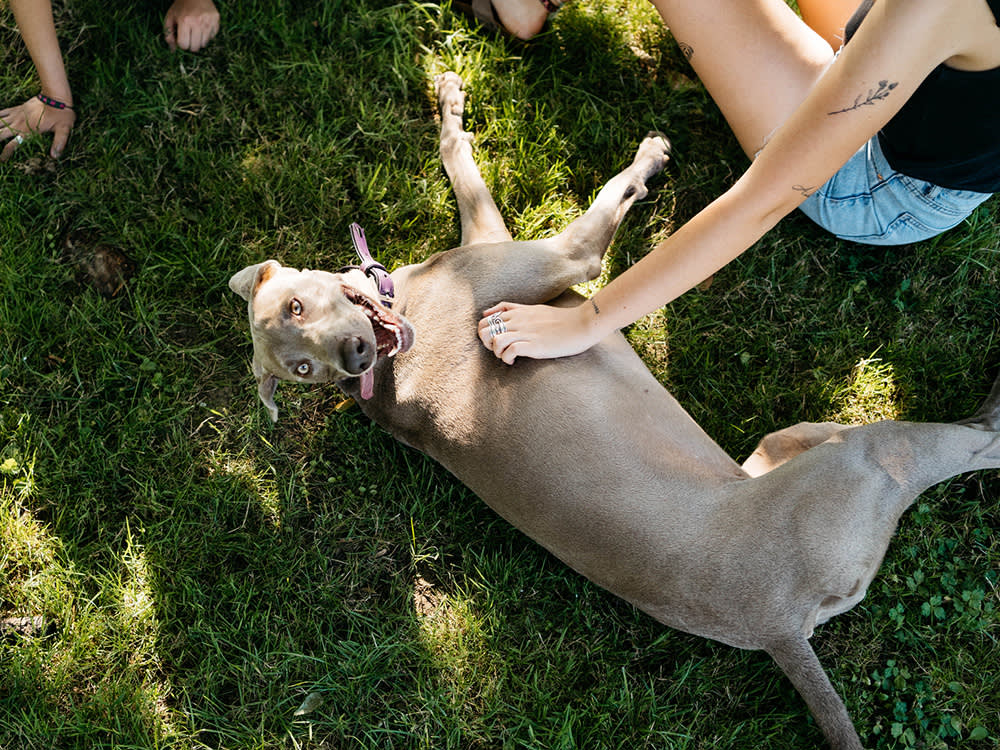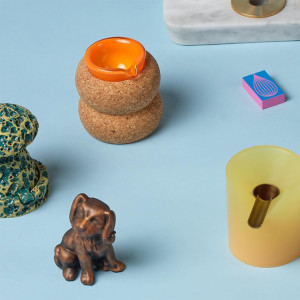Research Confirms CBD Is a Safe Way to Get Your Dog to Chill Out
New research finds the hemp derivative can help your dog with car and separation anxiety.

share article

Your pet wants you to read our newsletter. (Then give them a treat.)
Gone are the days of CBD being seen as America’s next top snake oil. Instead, it seems every few months more substantial evidence drops supporting at least a portion of its ostensibly endless favorable claims. This influx of research backs CBD as the sexy, new all-natural alternative treatment for a number of common ailments such as chronic pain, inflammation, and insomnia.
And while CBD may not be the healthcare cure-all some purport it to be, it clearly offers a range of benefits for us and those we hold most dear. In fact, a recent study from the Waltham Petcare Science Instituteopens in a new tab finds that even a single dose of CBD can effectively reduce stress in dogs.
What does CBD actually do for dogs?
Before we get into the study, a quick recap might be helpful for those of us who aren’t currently drinking the hemp tea. Cannabidiol, aka CBD, is an active ingredient of the cannabis plant. But! This is not your father’s marijuana — it contains no THC; in other words, it is non-psychoactive. Several brands and researchers have suggested that CBD does have calming properties, which explains its frequent use as a de-stressor for both humans and animals alike. The Waltham Petcare Science Institute, which is the science hub for Mars Petcare, set out to determine the legitimacy of these claims — at least on the dog front.
“We know pet owners try various approaches — from training to medications and supplements — to help their dogs cope with stressful situations often with mixed results,” says Dr. Jennifer Welser, Chief Medical Officer of Mars Veterinary Health, in a statementopens in a new tab. “We’re focused on scientific inquiry that generates knowledge that can inform pet professionals’ and pet owners’ decisions. So, this study is important because it gives us new evidence that CBD at the dose studied can be beneficial for dogs in specific circumstances.”
So, can CBD help with your super anxious dog?
If you have a pup who’s a little road tripopens in a new tab-resistant or literally claws the floor when you leave the houseopens in a new tab, CBD might be your solution. The study examined how CBD may alleviate stress from separation or car ridesopens in a new tab — stating that these are two of the most common factors to upset a pup. The study notes: “Pet dogs are likely to experience a variety of stress-inducing scenarios over their lifetime, often due the relationship they have with people. These are often unavoidable and are commonly related to events such as car travel and separation from caregivers or conspecifics.”
The study goes on to note that the pandemic has caused separation anxiety in dogs to increase — and will continue to do so. Additionally, The Waltham Petcare Science Institute reports that one in four dogs suffer from travel-related issues and frequently display behaviors including trembling, panting, shakingopens in a new tab, hyper-salivating, self-lickingopens in a new tab, barkingopens in a new tab, and whiningopens in a new tab. Of course, no one wants to see their pup upset, but these symptoms can also be dangerous. According to the study, “Notwithstanding the dog’s emotional and physical discomfort, these behaviors could distract the driver, possibly endangering the pet, caregiver, and other road users.”
How do we know CBD actually helps anxious dogs?
To evaluate whether the hemp derivative may operate as a possible remedy, researchers randomly assigned 40 dogs into two groups for a six-month testing period. Half of the participating dogs were placed into the CBD group, while the other 20 operated as a placebo group. Those in the CBD group were regularly given a single dose of 4 milligram broad-spectrum CBD two hours prior to being introduced to stressful events, like vehicle-bound travel or being left alone. The placebo group entered these situations as they would normally.
OK, but is untreated anxiety actually a problem for dogs?
The findings, which were published in Frontier in Veterinary Science last week, revealed that the dogs who were given CBD experienced significantly lower cortisol levels, whined less, and overall appeared more relaxed compared to those in the placebo group. The dogs who did not receive CBD were rated as being more stressed, tense, and uncomfortable during these events, too.
Anyone who has attended a high school driver’s ed class can attest to the importance of safe driving, a feat not easily accomplished with an anxious canine in the passenger seat. And all pup parents know there are few things more heartbreaking than the guilt of leaving your upset dog at home. Unfortunately, those aren’t the only concerns. Researchers warn that if not addressed, these occurrences of anxiety can compound and begin to negatively affect a dog’s health.
“Although mild stress is not considered harmful, welfare is compromised if an animal experiences high levels of acute stress or is exposed to prolonged stressors which can lead to chronic physical and emotional health issues,” the study states.
Ultimately, like with any emerging treatment, more research is still needed. But the Waltham Petcare Science Institute’s study adds more fuel to the pro-CBD fire and indicates that, at a minimum, the hemp derivative can be an effective tool in suppressing stress in anxiety-ridden pups.
In turn, a chilled-out pet can calm down their parents. “Due to the ever-changing human-pet relationship, there is an increasing requirement for dogs to fit into human lifestyles which can cause stress and anxiety to both people and their pets,” the study adds. In short, this could be good for everyone.
Disclaimer alert: This article is here to share information. But, much like pineapple on pizza, the topic may be controversial. Meaning, not all vets or pet professionals agree. Because every pet is a unique weirdo with specific needs. So, don’t take this as fact or medical advice. Talk things over with your vet when making decisions, and use your best judgment (about both your pet’s health and pizza toppings).

Sean Zucker
Sean Zucker is a writer whose work has been featured in Points In Case, The Daily Drunk, Posty, and WellWell. He has an adopted Pit Bull named Banshee whose work has been featured on the kitchen floor and whose behavioral issues rival his own.
Related articles
![a Dalmation sits in a black chair]() opens in a new tab
opens in a new tabMerci Collective’s Crystal-Infused Products Are Calming Anxious Pets
Whether or not you believe in crystal healing, Chani Ronez’s chic, customizable, and sustainable products are designed to help treat everything from separation anxiety to joint pain to GI issues.
- opens in a new tab
Does Your Dog Need Anti-Anxiety Meds?
How to cope with dog anxiety—from training to medication.
![Muscular white pit bull stands on couch, looking out window to sunny fall day.]() opens in a new tab
opens in a new tabSeparation Anxiety in Dogs
Does your dog freak out when you head for the door? Here’s some advice.
![Seth Rogan’s Houseplant Zelda Dog Lighter Caddy]() opens in a new tab
opens in a new tabOf Course Seth Rogen Designed A Lighter Caddy in the Likeness of His Dog
The loveable stoner pays tribute to his pup, Zelda, the best way he knows how — through handmade smoking paraphernalia.
![A woman sitting on a couch with a dog.]() opens in a new tab
opens in a new tabDoes Your Pet Need Therapy?
Dogs and cats can’t read self-help books, so a veterinary behaviorist explains how your pet may benefit from being in treatment.
- opens in a new tab
Do Anxious Dog Parents Raise More Anxious Dogs?
Which comes first: a nervous person or a nervous pup?








